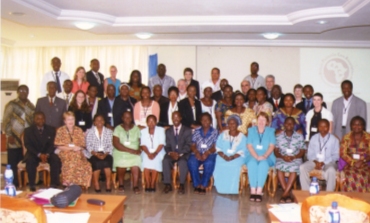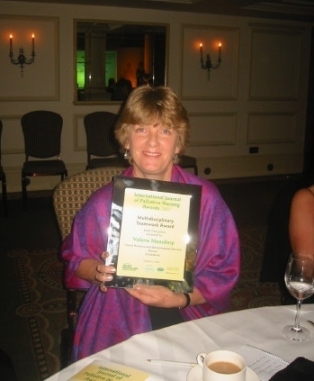|
Regional Reports
Advancing drug availability in West Africa
By Dr Henry Ddungu, MBChB MMed and Richard A. Powell, BA MA MSc
In May 2006 the 59th United Nations (UN) World Health Assembly adopted resolution 58.22, thereby recognizing the importance of improving pain relief treatment using opioid analgesics and calling upon member states to remove barriers to their medical use and availability.
Whilst advances have been made pursuing this agenda in Africa (e.g., legalization of oral morphine prescription rights for nurses and clinical officers in Uganda, approval of access to morphine for hospices in Zambia, and advocacy progress in Malawi and Kenya), challenges remain. They
include:
- inadequate funding to mobilize and provide authorized pain relief;
- the protracted nature of policy change;
- continued 'criminalization' of pain relief; and
- inadequate in-service training to address the 'opiophobia' that restricts health professionals' prescribing and dispensing practices.
In an effort to advance the UN resolution and promote the availability of essential pain medicines in West Africa, the African Palliative Care Association (APCA) hosted a regional essential pain medication accessibility workshop on 9th-11th May 2007 in Accra, Ghana.
With participants from 6 West African countries (i.e. Cameroon, Cote d’Ivoire, Ghana, Nigeria, Sierre Leone and The Gambia), the workshop replicated a meeting held in Entebbe, Uganda, in June 2006 for East African countries. However, unlike the typical workshop format in
which attendees passively participate with minimal tangible outcomes to justify donors’ financial support, we chose to use an innovative and interactive format (acknowledged as a best practice model in Africa by the Office of the Global AIDS Coordinator and the US Government Palliative
Care Technical Workgroup).
The aim of the meeting was three-fold:
- to improve participants’ knowledge of the policies, tools, and infrastructure necessary to make opioids available;
- to support participants in evaluating their country-specific drug policies and laws on opioid availability, and;
- to support participants in developing tangible advocacy action plans that can facilitate the accessibility to, and availability of, opioids.
The format used was as follows.
- First, each country participating in the meeting identified a technical team comprised of a minimum of four people, with a designated team leader and coordinator. Team members were reflective of a broad sector of health care providers,
including practitioners, administraters, government, etc.
The team leaders, who became the primary channel of communication with the rest of the teams, had the responsibility of ensuring that the right people were identified and selected (i.e., those who have demonstrated a commitment to the goal of the project as well
as a willingness to work closely with their respective MoH).
- Second, as part of the pre-workshop preparation, an overview was provided of the current drug availability status and challenges in respective countries. The teams completed a pre-workshop self-assessment checklist to determine current government
policy on the availability of opioid analgesics in their country. This was supplemented by the Barriers to Opioid Availability Test (Joranson, 1993), which collects information on the nature and severity of the impediments to opioid availability for pain relief.
- Third, at the workshop itself, participants heard presentations on pain control, drug conventions, and discussions concerning access to analgesics from internationally recognized experts (e.g. from the World Health Organization, and the Pain
and Policy Studies Group at the University of Wisconsin) before they delivered verbal presentations that helped to identify country-specific accessibility barriers to opioid and other essential medications.
- Fourth, the presentations stimulated the interactive development by participants of country specific action plans with support from small teams of palliative care and pain specialist facilitators who addressed recognized policy impediments.
- Lastly,
in order to ensure continuity in work programs and provide the impetus to implement the resulting action plans, APCA will maintain contact with the country teams to offer technical assistance (TA) where financially possible, and to document successes, lessons learnt,
and continued challenges using a post-workshop monitoring and evaluation framework.
As part of the TA follow-up, the teams were encouraged to embrace more strategically positioned stakeholders in their team, an approach that is leading to beneficial results in Eastern Africa.
Clearly, using this innovative workshop format does not negate the need for the use of a myriad of advocacy strategies to address such issues as governmental resistance to change, and the misperceptions of the general public and health professionals regarding opioids. Indeed,
APCA hopes to start addressing these and other issues using advocacy over the next five years. However, the workshop has proven to be a critical lever in beginning to change palliative care drug policy agendas in the Eastern Africa region. It is hoped that similar success
can be achieved for the Western Africa region also.

Photo: Participants at the APCA Accra regional drug availability workshop
References
Joranson, D. (1993) Availability of opioids for cancer pain: Recent trends, assessment of system barriers, new World Health Organization guidelines, and the risk of diversion. Journal of Pain and Symptom Management, 8: 353-60
Authors
Dr Henry Ddungu, MBChB MMed, Advocacy Manager
Richard A. Powell, BA MA MSc, Monitoring & Evaluation & Research Manager
African Palliative Care Association, P.O. Box 72518, Kampala, Uganda
Contact: Dr Henry Ddungu
Email: [email protected]
Zimbabwe: Multidisciplinary Teamwork Award
Valerie Maasdorp of Island Hospice and Bereavement Service, Harare, Zimbabwe received the Multidisciplinary Teamwork Award for 2007 at the Third International Journal of Palliative Nursing (IJPN) awards ceremony, held at the
Savoy Hotel, London, United Kingdom on 23 March 2007. The awards were judged by a panel of well-respected professionals who highlighted and rewarded excellence in evidence-based palliative care.
Good palliative care depends on teamwork between professionals, patients and carers. The aim of this award is to highlight inspirational multidisciplinary work. The judges honored the teamwork that Island Hospice and Bereavement Service, the first hospice in Africa, has provided in
Zimbabwe since 1979. They also noted that Zimbabwe has one of the highest orphan to adult ratios in the world, and recognized the pioneer training and support given young children caring for a dying parent.
IJPN is an essential source of reference for all health professionals of the palliative care team. Its international focus provides coverage of up-to-date developments worldwide.

Top of Page |



